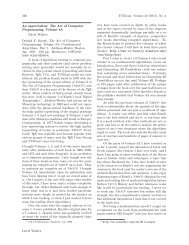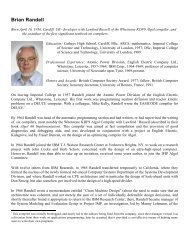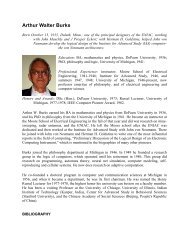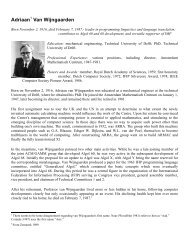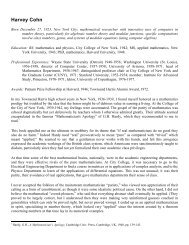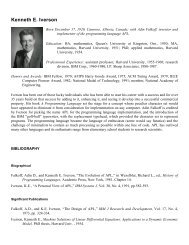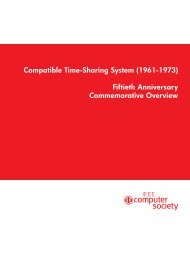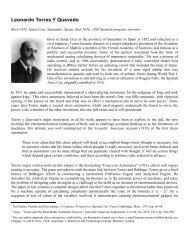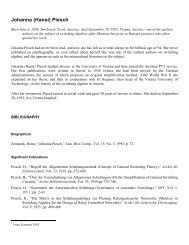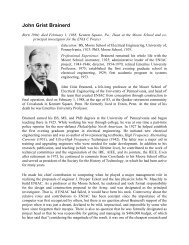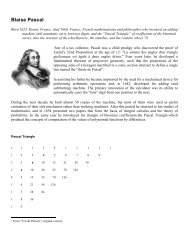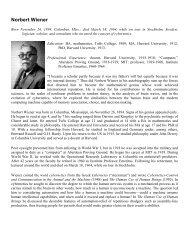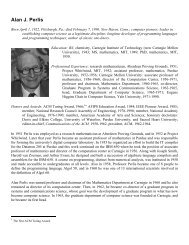Niklaus Wirth - Walden-family.com
Niklaus Wirth - Walden-family.com
Niklaus Wirth - Walden-family.com
- No tags were found...
You also want an ePaper? Increase the reach of your titles
YUMPU automatically turns print PDFs into web optimized ePapers that Google loves.
<strong>com</strong>puter Ceres (1984-1986). His most recent works produced the language Oberon, a descendant of Modula-2,which served to design the operating system with the same name (1986-1989). He was chairman of the Divisionof Computer Science (Informatik) of ETH from 1982 until 1984, and again from 1988 until 1990. Since 1990 hehas been the head of the Institute of Computer Systems of ETH.In 1978 Professor <strong>Wirth</strong> received honorary doctorates from York University, England, and the Federal Instituteof Technology at Lausanne, Switzerland, in recognition of his work in the fields of programming languages andmethodology. In 1983 he was awarded the Emanuel Priore prize by the IEEE, in 1984 the A.M. Turing Prize bythe ACM, and in 1987 the Award for Outstanding Contributions to Computer Science Education by ACM. TheACM Turing Award cited <strong>Wirth</strong> for “developing a sequence of innovative <strong>com</strong>puter languages Euler, Algol-W,Modula, and Pascal. Pascal has be<strong>com</strong>e pedagogically significant, and has provided a foundation for future<strong>com</strong>puter language, systems, and architectural research.” In 1987 he was awarded an honorary doctorate by theUniversité Laval, Canada, and in 1988 he was named a Computer Pioneer by the IEEE Computer Society.In 1989 Professor <strong>Wirth</strong> was awarded the Max Petitpierre Prize for outstanding contributions made by Swissnoted abroad, and he received the Science and Technology Prize from IBM Europe. He was awarded the MarcelBenoist Prize in 1990. In 1992 he was nominated Distinguished Alumnus of the University of California atBerkeley. He is a member of the Swiss Academy of Technical Sciences and a Foreign Associate of the USAcademy of Engineering.QUOTATIONSRegarding Pascal: “In the interest of increased quality of software products, we may be well advised to get ridof many facilities of modern, baroque programming languages that are widely advertised in the name of 'userorientation,''scientific sophistication,' and 'progress. '”In introducing Professor <strong>Wirth</strong> to present his Turing Award Lecture in 1984, ACM president Adele Goldberg<strong>com</strong>mented: “In Europe he is called by name-<strong>Wirth</strong> (pronounced virt), while in America we know him byvalue-<strong>Wirth</strong> (pronounced worth)!”BIBLIOGRAPHYSignificant Publications<strong>Wirth</strong>, N., “The Programming Language Pascal,” Acta Informatica, Vol. 1, June 1971, pp. 35-63.Hoare, C.A.R., and N. <strong>Wirth</strong>, “An Axiomatic Definition of the Programming Language Pascal,” ActaInformatica, Vol. 2, 1973, pp. 335-355.<strong>Wirth</strong>, N., PASCAL-User Manual and Report (with Kathy Jensen), Springer-Verlag, Berlin, 1974.<strong>Wirth</strong>, N., Algorithms, Data Structures, Programs, Prentice-Hall, Englewood Cliffs, NJ., 1975.
<strong>Wirth</strong>, N., Programming in Modula-2, Springer-Verlag, Heidelberg, New York, 1982.<strong>Wirth</strong>, N., “The Programming Language Oberon,” Software-Practice and Experience, Vol. 18, No. 7, 1985, pp.671- 690.<strong>Wirth</strong>, N., Programming in Oberon (with M. Reiser), Addison-Wesley, Reading, Mass., 1992.<strong>Wirth</strong>, N., Project Oberon (with J. Gutknecht), Addison-Wesley, Reading, Mass., 1992.UPDATESPortrait added (MRW, 2013)



